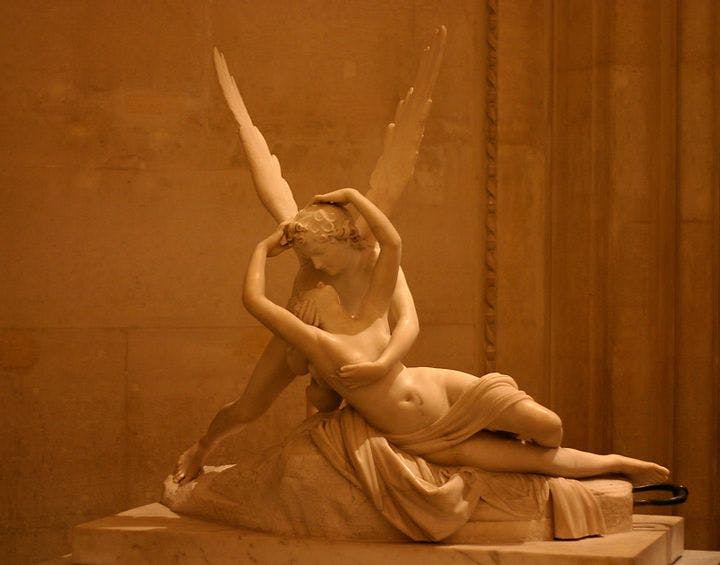Summer 2009
Ancient Passions
– F.S. Naiden
On love in ancient Greece.
The Greeks and Greek Love is less ambitious than its title. One kind of Greek love, love of god, does not figure in these pages. Neither does another, patriotism. Nor does a third kind, love of argument, for though Davidson has a thesis, he expatiates rather than argues. By “love” James Davidson means only “Greek homosexuality,” on which he has written a lengthy survey that ranges over Greek culture and society from the Archaic Period, beginning around 700 BC, to the Hellenistic Period, which terminated with the conquest of Greece by the Romans in 146 BC.
For nearly 2,000 years, Greek homosexuality was a neglected topic. Classical scholars knew of customary homosexual relations between older and younger Greek male citizens. In his Symposium, Plato wrote of the relationship between the elderly Socrates and the young Alcibiades, an Athenian general and politician. Homosexual ties among soldiers were another identifiable Greek custom. The sexual abuse of slaves did not exclude homosexual abuse, and scholars knew this too, although they ignored it, just as they ignored other aspects of Greek slavery. Yet Greek male homosexuality made less of an impression than the lesbianism of Sappho, a Romantic household name. Only scholars doubted her love poems showed that she was homosexual. The male version of these noble, Sapphic sentiments was chaste friendship (but not homosexuality), especially friendship of a philosophical turn: Socrates and Alcibiades again. This image of Greek men owed more to the canonized torsos of Classical sculpture than to pedestrian historical sources.
Then, in the 1970s, as Davidson writes in his fourth—and best—chapter, Sir Kenneth Dover led the way in drawing a new picture: a homosexuality of acts, not poses, with the frequent rape of less powerful partners by more powerful ones. Davidson says that Dover and others have made too much of homosexual acts and too little of homosexual bonding, pointing out that Greek homosexuals courted as well as raped each other. And he claims that Dover overemphasized the distinction between more and less powerful participants. In courtship, power took diverse forms, and so the older citizen male, for example, did not always control his younger lover.
Davidson’s critique has the merit of scholarly common sense. As careful readers of Greek literature have always known, many Greek homosexual relations were asexual, or centered on intercrural, not anal or oral, sex. Whatever these relations were, sexual conduct was one thing, erotic life was another, and the way that power affected either one of them was yet another. To see power and nothing else is the mistake that Lenin, in writing about politics, called economism (and that plagued leftwing writers down through Stalin and beyond).
Davidson, though, thinks this mistake is anti-gay, not anti-intellectual. He is something of a dinner-party crusader on behalf of Greek gay courtship and even Greek gay marriage. Spartan lesbians, he says, were “married,” which in ancient Greece would mean joined as husband and wife. There is no evidence for this conclusion. Davidson also says that Achilles, the warrior hero of The Iliad, may have been married to his comrade Patroclus. He forgets that a Greek bride was almost always younger than her spouse. Since Achilles was younger than Patroclus, he would have to have been the bride. Yet there is nothing bridal about Achilles—nothing at all. In both of these instances, Davidson sees marriage as a kind of companionship. This, too, is wrong. Greek marriages were bargains struck by the bride’s father with the groom. The one gave her to the other for the purpose of bearing legitimate children. If she did not bear legitimate children, the groom could get them by impregnating a mistress.
Davidson made his point about Dover in an earlier book, Courtesans and Fishcakes: The Consuming Passions of Classical Athens (1998), which is only half as long. Caveat emptor. Weigh before you pay.
* * *
F.S. Naiden is an assistant professor of ancient history at the University of North Carolina, Chapel Hill.
Reviewed: The Greeks and Greek Love: A Bold New Exploration of the Ancient World by James Davidson, Random House, 789 pp, 2009.
Photo courtesy of Flickr/Ivo Jansch
Up next in this issue
